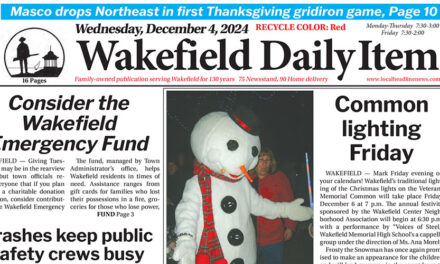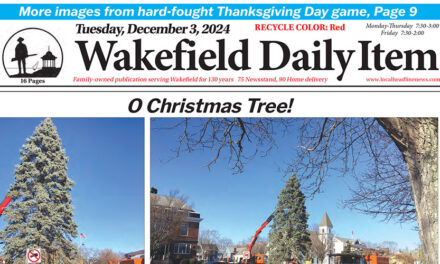Published in the March 15, 2021 edition.
By MARK SARDELLA
WAKEFIELD — The Planning Board will begin looking at what proactive steps the board could take toward protecting Lake Quannapowitt and the areas around the Lake. Exactly what form those protections might take was the subject of a brainstorming session at last week’s meeting.
The idea was floated by board member Joanne Scouler, who argued that one of the functions of a Planning Board ought to be proactive planning around things like protecting the Lake. She suggested that the board might want to develop zoning bylaws to restrict the height of buildings and density around the Lake.
Chairman William Spaulding told the board that he hosted a recent session as part of the Vision 2030 initiative and the topic of the Lake came up over and over in the discussion.
He said that it would be great to figure out some approach using the Zoning Bylaws that would protect the Lake and environs by addressing things like building height and density. He said that such an effort would require figuring out what distance around the Lake would be involved and what zoning is already in place.
Veteran Planning Board member Matthew Lowry voiced some questions, if not skepticism, about the proposal. He said that it appeared that the only parcels that could be targeted would be the limited business district at the head of the Lake. He pointed out that the only other abutters to the Lake are residences, some municipal property and cemeteries.
Board member Megan Menesale said that her questions were about the process and how it would work across different zoning districts. She wondered if an overlay district would be the approach taken.
Scouler suggested that the Planning Board could take the lead in creating some kind of multi-board subcommittee with representatives from the other boards like the Conservation Committee and the Town Council.
But Lowry again tried to get clarity on exactly what such an initiative would be trying to accomplish. He reiterated that if the goal was to control height and density, the only area affected would be the limited business district at the head of the Lake. If the goal is to address pollution of the Lake or light pollution around it, that would be a broader question, he said.
Spaulding said that he wanted his kids and grandchildren to be able to enjoy the Lake.
Scouler said that her idea was to protect the views and the environmental sustainability of the Lake. She said that the board should start by determining what is acceptable in terms of the height of buildings around the Lake, “or we’ll see more of the Jordan’s Furniture approach.”
Lowry pointed out that if the intention was to control how close things could be built to the wetland areas, the town already has a board (the Conservation Commission) that handles those matters.
Menesale said that she liked the idea of working with other boards but thought that the Planning Board should identify the overall goals first.
But Lowry wondered if what was being discussed would fall more into the realm of master planning than zoning. If height and density were the main concerns, the only area the board could focus on would be the aforementioned Limited Business district at the head to the Lake. The zoning for residential districts, he pointed out, is already codified in the Zoning Bylaws.
Economic Development Director Erin Kokinda was in attendance at the Zoom meeting and agreed that what was being discussed sounded more like bigger picture subject matter. She noted that she is in the process of applying for grants to help the town develop a new Master Plan, which hasn’t been done since 2003.
Scouler said the board should summarize what its goals would be in terms of setting restrictions on development right around the Lake and then work on a zoning bylaw or overlay district.
Spaulding volunteered to work with Scouler to document the height, density and setback restrictions already in place in the various zoning districts around the Lake and bring back their findings to a future meeting.
Elm Street resident Dan Lieber reminded the board that there is a Bylaw Committee in place that is scheduled to review the town’s Zoning Bylaws next year.
Local attorney Brian McGrail prevailed upon the board to involve lakeside property owners early in any process that could impact the zoning of their properties. Otherwise, he warned, nervous property owners might take legal steps to freeze the zoning of their properties.




